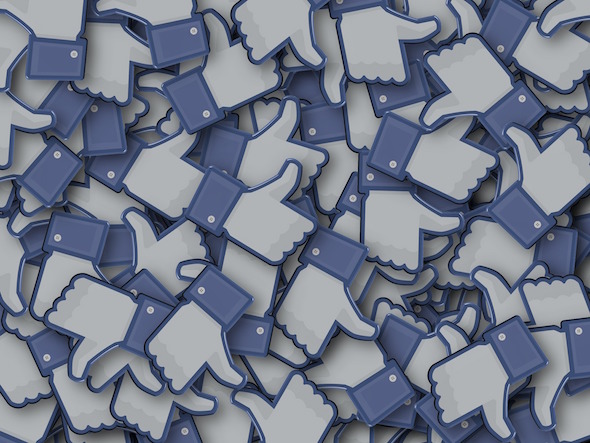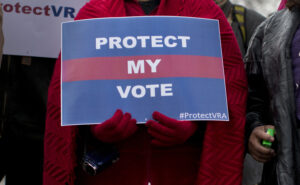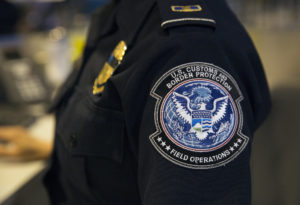Bigoted Cops Show True Colors in Online Hate Groups
In public Facebook pages and private groups, police officers trade racist memes, conspiracy theories and Islamophobia. Shutterstock
Shutterstock
This article was originally posted on Reveal News.
Hundreds of active-duty and retired law enforcement officers from across the United States are members of Confederate, anti-Islam, misogynistic or anti-government militia groups on Facebook, a Reveal investigation has found.
These cops have worked at every level of American law enforcement, from tiny, rural sheriff’s departments to the largest agencies in the country, such as the Los Angeles and New York police departments. They work in jails and schools and airports, on boats and trains and in patrol cars. And, Reveal from The Center for Investigative Reporting discovered, they also read and contribute to groups such as “White Lives Matter” and “DEATH TO ISLAM UNDERCOVER.”
The groups cover a range of extremist ideologies. Some present themselves publicly as being dedicated to benign historical discussion of the Confederacy, but are replete with racism inside. Some trade in anti-Semitic and anti-immigrant memes. Some are openly Islamophobic. And almost 150 of the officers we found are involved with violent anti-government groups such as the Oath Keepers and Three Percenters.
More than 50 departments launched internal investigations after being presented with our findings, in some cases saying they would examine officers’ past conduct to see if their online activity mirrored their policing in real life. And some departments have taken action, with at least one officer being fired for violating department policies.
U.S. law enforcement agencies, many of which have deeply troubled histories of discrimination, have long been accused of connections between officers and extremist groups. At the Unite the Right rally in Charlottesville, Virginia, marchers flew a “Blue Lives Matter” flag alongside anti-Semitic and white supremacist messages. In Portland, Oregon, police officers were found to have been texting with a far-right group that regularly hosts white supremacists and white nationalists at its rallies. A classified FBI Counterterrorism Policy Guide from April 2015, obtained by The Intercept, warned that white supremacists and other far-right groups had infiltrated American law enforcement.
It can be difficult to determine how deep or widespread these connections run. Researchers recently found numerous examples of police officers posting violent and racist content on their public Facebook pages. Reveal’s investigation shows for the first time that officers in agencies across the country have actively joined private hate groups, participating in the spread of extremism on Facebook.
Most of the hateful Facebook groups these cops frequent are closed, meaning only members are allowed to see content posted by other members. Reveal joined dozens of these groups and verified the identities of almost 400 current and retired law enforcement officials who are members.
One guard at the Angola prison in Louisiana, Geoffery Crosby, was a member of 56 extremist groups, including 45 Confederate groups and one called “BAN THE NAACP.”
A detective at the Harris County Sheriff’s Office in Houston, James “J.T.” Thomas, was a member of the closed Facebook group “The White Privilege Club.”
The group contains hundreds of hateful, racist and anti-Semitic posts; links to interviews with white supremacists such as Richard Spencer; and invites to events such as the deadly Unite the Right rally in Charlottesville. Users regularly post memes featuring Pepe the Frog, the alt-right mascot, with captions such as, “white people, do something.” And there are explicitly racist jokes, such as one with a photo of fried chicken and grape soda with the caption, “Mom packed me a niggable for school.”
Thomas once posted the logo for the Black College Football Hall of Fame inside the group with a simple caption: “Seriously. Why?” Soon after, he posted a meme about an elderly African American woman confusedly responding to a reporter’s question by naming a fried chicken restaurant.

After being presented with Thomas’ postings on Facebook, the Harris County Sheriff’s Office fired him in February for violating a number of employee conduct policies.
“These policies state that ‘an employee’s actions must never bring the HCSO into disrepute, nor should conduct be detrimental to the HCSO’s efficient operation. … Personnel who, through their use of social media, cause undue embarrassment or damage the reputation of, or erode the public’s confidence in, the HCSO shall be deemed to have violated this policy and shall be subject to counseling and/or discipline,” the department said in an email.
In a hearing to appeal his firing, Thomas said he didn’t realize he was a member of the closed group and defended his behavior. “If you remove the black female out of the picture, what’s racist about it?” he said. The Harris County Sheriff’s Civil Service Commission upheld his firing.
Lonnie Allen Brown of the Kingsville Police Department in Texas, a member of three Islamophobic groups, posted a photo of a young black man with a pistol to his head with the header, “If Black lives really mattered …. They’d stop shooting each other!” He also posted an image that read: “Islam. A cult of oppression, rape, pedophilia and murder cannot be reasoned with!” Neither he nor his department returned calls for comment.

Peter Simi, an associate professor of sociology at Chapman University who has studied extremist groups for more than 20 years, said biased views like those expressed in these Facebook groups inevitably influence an individual’s decision-making process.
“The perceptions we have about the world at large drive the decisions we make,” Simi said. “To think that people could completely separate these extremist right-wing views from their actions just isn’t consistent with what we know about the decision-making process.”
While Facebook vows that it prioritizes meaningful content, its algorithms also appear to play a role in strengthening biases. The more extreme groups we joined, the more Facebook suggested new – and often even more troubling – groups to join or pages to like. It was easy to see how users, including police officers, could be increasingly radicalized by what they saw on their news feed.
What’s harder to see is how these views affected their policing offline.
Disciplinary records and investigations into police misconduct are kept secret in a majority of states, meaning most American cops enjoy a blanket of protection that can cover up biases. But in some cases, we found public documents that showed the officers we identified via Facebook also had been involved in real-life instances of alleged racism or other misconduct.
Will Weisenberger, a sheriff’s deputy in Madison County, Mississippi, was a member of a closed Facebook group called “White Lives Matter.” He’s also been caught up in a lawsuit filed by the American Civil Liberties Union against the department for allegedly engaging in decades of systemic racism and discriminatory policing.
Racism was so systematic at the Madison County Sheriff’s Department, the ACLU asserts, that the department’s blank arrest forms came with two words already filled in: “Black” and “Male.”
Lawyers for the ACLU deposed Weisenberger and asked him about an incident in which a fellow deputy alleged that Weisenberger had punched an African American man in the face while the man’s hands were cuffed. Then they asked him if he ever uses any racial slurs while on duty.
“I may have used the N-word,” Weisenberger said, according to the deposition.
“It’s not something I’m proud of or do every day,” he continued.
Neither the Sheriff’s Department nor Weisenberger responded to calls for comment. The Sheriff’s Department wouldn’t release Weisenberger’s disciplinary record or a copy of the complaint made by his colleague. Police disciplinary records in Mississippi are confidential.
In Chicago, Lt. Richard Moravec was a member of a closed Facebook group called “Any islamist insults infidels, I will put him under my feet,” which disappeared from Facebook before we could join it or search it for posts by officers.
While we don’t know if he ever interacted with the Islamophobic group, Moravec has posted content that appears to be openly anti-transgender and anti-Islam on his personal Facebook page.
One meme Moravec posted featured a photo of a young girl with the caption, “Please! Don’t confuse me. I’m a girl. Don’t teach me to question if I’m a boy, transexual, transgendered, intersexed or two spirited.”

And Chicago’s open records on police conduct revealed that he also has been the subject of 70 allegations, including accusations of illegal use of force, verbal abuse and criminal misconduct, according to the Citizens Police Data Project. That’s more than 99 percent of Chicago police officers. One of the allegations resulted in a five-day suspension.
To find cops with connections to extremist groups, we built lists of two different types of Facebook users: members of extremist groups and members of police groups.
We wrote software to download these lists directly from Facebook, something the platform allowed at the time. In mid-2018, in the wake of the Cambridge Analytica scandal and after we already had downloaded our data, Facebook shut down the ability to download membership lists from groups. Then we ran those two datasets against each other to find users who were members of at least one law enforcement group and one far-right group.
We got 14,000 hits.
We did not assume that everyone in a police Facebook group was an actual officer, because many could be relatives of police officers or just really into law enforcement. So, we spent months poring over individual Facebook pages, looking for clues, such as photos of the officer in uniform, or posts about police events, or notes mourning lost cops. Then we corroborated what we found on Facebook with additional research, often calling the departments to confirm the individual either still or had once worked there.
Ultimately, we confirmed that almost 400 users were indeed either currently employed as police officers, sheriffs or prison guards or had once worked in law enforcement.
We then asked to join the closed extremist groups. Many groups ask users questions in order to join, and these often offer insight into the nature of the group. The group “Stop Radical Islam in America,” for example, asks, “Why do you personally think Islam should be banned in America?” At least 12 current and former police officers were members of that group.
The group “Confederate Brothers & Sisters,” which counts at least 25 current and former cops as members, explicitly asks, “This group is sometimes racist does this bother you?” Inside that group, we found several cops and ex-cops posting racist comments.
We used our real names and photos and answered the questions honestly to join these groups. We used general language, often saying we were “interested in learning more.” As a result, many of the most extreme groups rejected our application to join, ignored us or blocked us from viewing the group.
But dozens let us in.
We didn’t seek to find every single hate group or police group on Facebook, and we couldn’t confirm the professions of hundreds of the users in our database.
Several officers claimed that they didn’t even know they were members of the closed groups we identified them in. And that’s probably the case for at least some of these officers, due to Facebook’s policies for joining groups.
Until late 2018, Facebook allowed users to invite friends to join groups they thought would interest them. The invitees would receive a notification telling them they were a member of a new group, and depending on each user’s algorithm, the user’s news feed might include content and postings from the group. But it’s certainly possible that cops could have been added to groups without realizing it, especially if they’re not active on Facebook.
Facebook has since changed its policies. Users now get a request to join a group that they have to confirm.
But that doesn’t apply to dozens of current and retired officers who have commented on and liked posts in closed extremist groups or who proactively joined groups themselves, without being invited by somebody else.
We examined a tiny sample of what exists on Facebook — what Megan Squire, a computer science professor from Elon University in North Carolina, called “a tiny, postage-stamp-sized window into Facebook’s skyscraper of data.”
Squire, who has studied hate groups on Facebook for years and maintains her own database, said the social media platform, and especially closed groups, are used by hate groups such as white supremacists to plan events and build camaraderie.
“Charlottesville was planned on Facebook,” Squire said. “Extremists are definitely using Facebook groups to plan physical, real-world events or just to make their lives a little smaller, to find friends.”
A spokeswoman for Facebook said the company doesn’t tolerate hate speech on the platform and works extremely hard to identify and shut down hate groups. In the last year, as part of a push to reform the company, Facebook has said it won’t tolerate white nationalist or white supremacist content, and it has moved to shut down the accounts of some of the most popular hate-speech provocateurs.
But while groups with overt neo-Nazi, white supremacist or Ku Klux Klan names get shut down relatively quickly by Facebook, hate groups have wised up in response.
As has happened elsewhere on the internet, extremist groups on Facebook often use in-jokes and subtle references in their names to avoid takedown policies. Moderators of closed groups control who can join, and on Facebook, cops can hide who they really are — using false names and listing pretend jobs.
Inside the closed Facebook groups to which we gained access, transparently racist, misogynistic and homophobic content is on full display. We catalogued more than 120 active and retired officers posting in these groups or commenting in support of others.
In one 48-hour period, civilian members of one closed group posted a steady stream of hateful content:
- One user posted a link to a piece about how the skins of African slaves were once turned into jackets. It garnered 34 comments and 103 emoticon responses in 24 hours. Almost all of the people reacting to the post gave it the “haha” response. “10/10 would wear, ” a commenter said.
- Another post mocked the removal of a citizenship question from the 2020 census, playing off the common white supremacist conspiracy theory that an international group of Jews is masterminding the immigration of Latinos into the United States. “When are we going to show everyone what the Jewish cabal is doing?” commented one member.
- A video showing an African American man being arrested by an African American police officer resulted in an immediate comment: “Just reading that made me crave some fried chicken and watermelon.”
At least six law enforcement officers were members of the group, which was called “Anti-SJW Pinochet’s Helicopter Pilot Academy.” The name showcases the wordplay central to the white supremacists’ rebranding as the “alt-right.” It refers to the Chilean dictator Augusto Pinochet, who had his political opponents thrown out of helicopters into the Pacific Ocean. “SJW” stands for “social justice warrior,” a term used to mock individuals who support equal rights for people of color, women and the LGBTQ community.
While the terminology is new and sometimes cryptic, the core messages of the alt-right echo longstanding neo-Nazi and white supremacist premises. Perry Tolliver, a retired corrections officer from Baltimore, and Michael Pinegar, a former Arizona Department of Corrections officer — who were both members of the Pinochet group until it disappeared from Facebook earlier this month — seemed well-versed in the alt-right’s terminology. In separate posts in the group, both Tolliver and Pinegar referred to African Americans as “dindus” — a racist slur common on Facebook and elsewhere.
In a similar vein, Detective Steve Fumuso from Westchester County in New York frequently inserted comments into posts in the Pinochet group that denigrated African Americans, Latinos and the LGBTQ community.
Fumuso posted a meme with a white man making the “OK” symbol — a favored gesture of the alt-right — and the words “fuckin mint” under a racist joke about Mexicans in December 2017. Earlier, he had commented, “Ha ha ha haaaa. Fuck em,” under a “Tucker Carlson Tonight” clip about Mexicans being worried about crime committed by Central American migrants.
Westchester County Public Safety Commissioner Thomas Gleason said the department’s Special Investigations Unit would launch an investigation.
In an interview months later, Fumuso said he had retired shortly after the internal affairs investigation. He said the two things had nothing to do with each other.
“I like memes, they make me laugh. I didn’t join to express any racist views,” he said. “I don’t care what you think. That’s my opinion. You know what’s a racist comment? ‘Brits are all full of shit.’ ”
(The reporter conducting the interview, Will Carless, has a British accent.)
Several officers contacted for this story countered that they have a First Amendment right to opine on social media, even if those opinions are unpopular or offensive to some people.
However, while civilians enjoy First Amendment protection from government censorship or harassment, the U.S. Supreme Court has ruled that public agencies such as police departments may penalize their employees for speech and behavior in certain cases.
Valerie Van Brocklin, a former federal prosecutor who trains police departments and other public employees on social media use, said police officers across the country have been fired or suspended for making off-color jokes or leaving problematic comments under newspaper articles.
“I ask them, ‘Would you, as a cop, in your uniform, put that on a sandwich board and walk up and down the streets of your town? ’ ” Van Brocklin said. “And they’ll say, ‘No, because I could be fired for that.’ Well, instead of putting it on a sandwich board, you put it up for the whole world to see, so why would you think it’s protected?”
No single code of conduct or ethics policy governs the thousands of jurisdictions in the U.S. that employ police officers. Different law enforcement agencies have widely differing standards for the behavior they accept from their personnel, and this was reflected in the responses we received from departments.
In Watkins Glen, New York, Sgt. in Charge Steven Decker refused to talk about the fact that one of his officers, Robert Brill, was a member of two groups connected to the Proud Boys, a violent alt-right gang, and the group “Kekistani Freestate,” named for Kek, a sort of deity employed by the alt-right for memes and other jokes.
“We don’t discuss personnel matters,” Decker said, before hanging up. Brill didn’t respond to calls for comment.
The Abbeville Police Department in Georgia hasn’t responded to multiple phone calls and emails about one of its officers, Joel Quinn, frequently featuring conspiracy theories and anti-Islam posts on his personal Facebook wall. He also has posted inside a Confederate group.

Reached via Facebook Messenger, Quinn defended his posts. “Its also my responsibility to detect possible threats to my community all the way up to and including my country,” he wrote. “Think about this, majority of crimes are committed by minorities (black, hispanic, etc) per FBI statistics yet I don’t ‘prey’ on any particular one.” (According to the latest FBI Uniform Crime Reporting statistics, 68.9 percent of arrestees in 2017 were white.)
The Wisconsin Department of Corrections hasn’t commented on corrections officer Sheldon Best, a member of “Crusades Against Degeneracy,” a group that trades in racist, anti-Semitic, anti-immigrant and homophobic content. In 2017, Best commented on an NPR story reporting that babies of color are now the majority in the United States. Below it, he wrote: “Maybe, but minority on minority homocide (sic) will make sure adults of color remain a minority.”

Best said in an interview that he was apologetic about this and other posts in the group. “Some people” could view his membership in the group as problematic, he acknowledged. However, he said that while some members of the group hold discriminatory views, he does not.
We provided the New York Police Department with posts from Officer Randy Paulsaint, a member of 13 groups committed to the anti-feminist Men Going Their Own Way movement.
The groups contain memes depicting women as evil, greedy and jealous. In one, someone posted a meme about a woman asking for a Christmas present. In the comments, Paulsaint inserted a gif of a man kicking a woman in the head.
The NYPD said its investigation was closed as unsubstantiated. “The investigation was unable to clearly prove or disprove that the subject officer made the offending posts,” the department said.
Peter Simi, the sociologist, said white supremacists and other extremists have been working hard to integrate their hateful views into society in as many ways as possible.
“Leaders have long been advocating for infiltration of society — graduate from high school, go to college, join the military, become a police officer, become a school teacher — get inside the system,” he said. “That’s why it’s so difficult to get a handle on the scope of this, because the purpose for those who are infiltrating these systems is to be careful not to tip their hands. So we’re always dealing with the tip of the iceberg.”
Researchers Daneel Knoetze and Michael Dailey contributed to this story.
Your support matters…Independent journalism is under threat and overshadowed by heavily funded mainstream media.
You can help level the playing field. Become a member.
Your tax-deductible contribution keeps us digging beneath the headlines to give you thought-provoking, investigative reporting and analysis that unearths what's really happening- without compromise.
Give today to support our courageous, independent journalists.









You need to be a supporter to comment.
There are currently no responses to this article.
Be the first to respond.